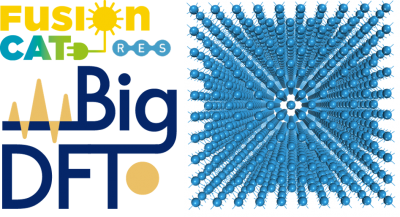
We are pleased to announce that our group has been awarded a new project at the Spanish Supercomputing Network (RES). RES will provide over 2 million CPU/h for the next 4 months (November 2020 – February 2021), with a likely extension for a second 4-month period (until June 2021) making a total of 4,397,000 CPU/h. We will use the RES top-quality resources in MareNostrum 4, equipped with 165,888 Intel Xeon Platinum 8160 cores, 2.10GHz with Intel Omni-Path.
This research will be led by the BSC Fusion Group researcher Dr Julio Gutiérrez Moreno, with the support and supervision of Prof Mervi Mantsinen and Dr Stephan Mohr (NEXTMOL, BSC). The project is titled Ab Initio Study of Defects in Tungsten from Linear Scaling Density Functional Theory Methods (RES-QS-2020-3-0026) and aims to set a complete ab initio description on the structural and electronic properties of defective W structures using the Linear Scaling Density Functional Theory (LS-DFT) methods implemented within the BigDFT code.
One of the big challenges towards the use of nuclear fusion as a source of clean and safe energy is the design of appropriate reactor components. While tungsten (W) is one of the best candidates due to its strength and high stability, defects produced by radiation may have a detrimental effect on its structure and mechanical behaviour. The outcomes from the proposed calculations are key to improve our understanding of the fundamental properties of W and will show the possibility of simulating realistic large-scale defective metallic systems with DFT calculations. This project is a continuation of our earlier work on W modelling with BigDFT, published in Nuclear Materials and Energy and from the research carried out by the Fusion Group MSc students Alba Gordó and Marc Eixarch, under the supervision of Dr Stephan Mohr and Prof. Mervi Mantsinen.
The present project will be developed within the framework of the FusionCAT project (001-P-001722). FusionCAT focuses its activities on various fields of expertise where partners already have internationally recognized experience such as numerical modelling, analysis and design of components and processes of fusion reactors. The study and development of materials for fusion reactors is one of the key technologies to develop during this project and will be carried out within the BSC Fusion Group.
The RES is an infrastructure involving 12 supercomputers distributed throughout Spain which work together to offer High-Performance Computing (HPC) resources to the scientific community. RES aims to support the development of top-quality cutting-edge research. All the resources are aimed at non-profit R&D purposes, and they are opened to research groups from academia and public research centres. Computing resources are granted through competitive calls, based on the criteria of excellence and scientific impact. Proposals are evaluated every four months by the access committee, advised by an expert panel composed of prestigious scientists. RES is coordinated by the Barcelona Supercomputing Center (BSC).
Source: www.res.es and www.fusioncat.es
The FusionCAT project with reference number 001-P-001722 has been co-financed by the European Union Regional Development Fund within the framework of the ERDF Operational Program of Catalonia 2014-2020, with the support of Generalitat of Catalonia.

1 thought on “Our Fusion Group’s project on Tungsten modelling by Linear Scaling DFT granted by RES”